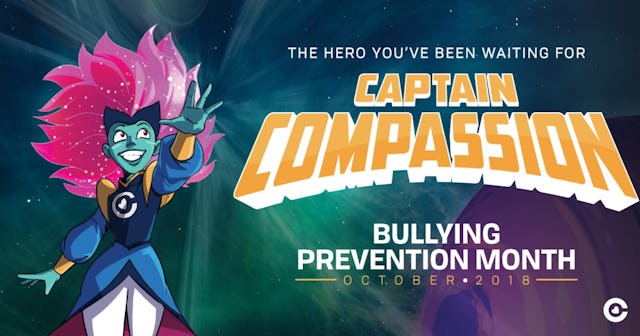'Captain Compassion' Is The Anti-Bullying Campaign We Need

The Committee for Children (CFC) is very excited to introduce you to a new and rad superhero. And you know what? I am pretty exited too. We all should be.
Captain Compassion and her loyal sidekick Kid Kinder have arrived just in time for October’s National Bullying Prevention Month. Captain Compassion uses Bystander Power to stop bullying and will be featured on a new website that offers parental advice and kids the courage to stand up to bullying. CaptainCompassion.org will host interactive lessons that will help students and parents understand bullying, who it affects, and how we can stop it.
CFC intends for this new anti-bullying campaign to appeal to kindergarten to middle school kids. A weekly comic strip series and access to digital swag when they take a pledge to report and stop bullying are just some of the perks.
Lest you think bullying is talked about too much or believe “boys will be boys” or that mean girls are just “strong leaders” leaning in, let’s go over some sobering statistics about bullying and why we need our kids to do better. According to PACER, the National Bullying Prevention Center that started Bullying Prevention Month in 2006, 1 out of every 5 students will report being bullied. 25% of African-American kids are bullied. 74% of LGBT kids are bullied—yes, you read that correctly. 3 out of 4 queer kids are verbally if not physically harassed at school. And to really hit this point home, a recent study showed 50% (HALF!) of transgender boys and 41% of nonbinary folks have attempted suicide. This particular study did not specify the reasons for suicide attempts, but lack of support, acceptance, and a feeling of safety have repeatedly been reported by transgender youth.
PACER also sites that 57% of bullying incidents stop when a peer gets involved. Bullying doesn’t only affect the target, but bystanders too. Watching and doing nothing negatively impacts mental health, while stepping in and helping a friend or peer provides a sense of allyship and pride. Bystanders will feel more inclined to intervene if they feel like they have the ability to make a difference. These peers are the people Captain Compassion hopes to empower.
Bully prevention expert, Matt Pearsall, tells Scary Mommy that we should remind kids to trust their gut. The first thing a bystander can do is alert a trusted adult of a bullying situation, and kids should not intervene unless they feel safe. “Directly intervening to stop bullying is actually a very difficult thing to do,” said Pearsall. “If we don’t acknowledge this, kids can feel ashamed that they didn’t jump in and be a hero, and that shame will prevent them from reporting. This becomes more of an issue as kids get older. What we can do to counter this is to highlight other ways a bystander can be an ‘ally’ to someone who’s being bullied.”
But why do some kids bully in the first place?
“Bullying, like most behavioral issues, is a symptom of some underlying problem,” says Pearsall. “Often, kids don’t have strong social skills and are uncomfortable making friends. They bully because that’s the only strategy they’re comfortable using to navigate their social world. Other times it’s because they’re being bullied themselves (a bully-victim cycle), or see adults in their lives bullying each other, and think that bullying is normal and acceptable.”
Through social-emotional learning, CFC uses research-based education to help stop this cycle of bullying. Parents and teachers can start teaching pro-social skills to kids as young as 3-years-old. Helping kids manage their emotions, guiding them through how to make good decisions, and equipping them with the techniques to deal with “everyday social and academic challenges” reduces bullying tactics. Parents and teachers also need to take their students’ complaints seriously and look for situations where a child may be bullied or at risk for being bullied. We also need to lead by example. Our kids need to see us being kind to each other so they can model positive behavior.
Captain Compassion was created by the Committee for Children so that kids can learn that they have the power to stop bullying. Captain Compassion is ready to show kids how to be supportive bystanders by being kind and inclusive. She also empowers students to stand up to or report bullying when they see it. In addition to the weekly comic, the site features an anti-bullying message by Disney Channel star Skai Jackson, video advice for kids and parents, printable worksheets, and a social media toolkit.
Learning how to be kind by reading comics and watching cool videos? Heck yeah. Your kids will be excited to join the fight against bullying, and that’s something we should all support.
This article was originally published on